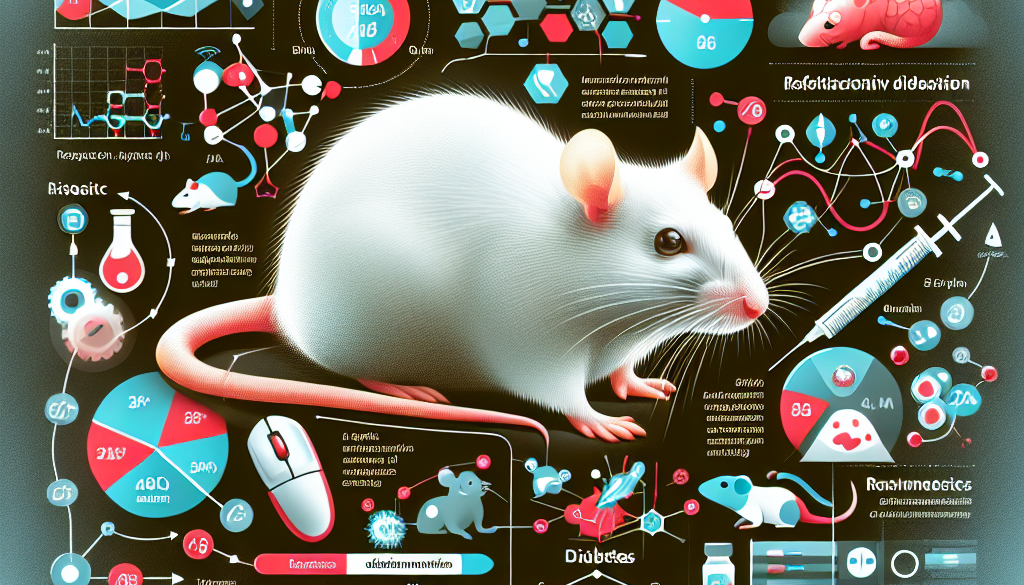Acacetin Diabetes Rats Diabetes Research Insights
-
Table of Contents
- Acacetin and Diabetes: Research Insights from Rat Studies
- Understanding Acacetin
- The Link Between Acacetin and Diabetes
- Insights from Rat Studies on Acacetin and Diabetes
- Acacetin’s Impact on Blood Sugar Levels
- Antioxidant Effects and Diabetes Complications
- Anti-inflammatory Action and Diabetes
- Case Studies and Examples
- Statistics and Prevalence of Diabetes
- Conclusion: Key Takeaways from Acacetin Diabetes Research
- Explore ETchem’s Protein Products for Diabetes Management
Acacetin and Diabetes: Research Insights from Rat Studies

Diabetes is a chronic disease that affects millions of people worldwide, and researchers are constantly seeking new treatments and preventive measures. One area of interest is the potential role of natural compounds in managing diabetes. Acacetin, a flavonoid found in various plants, has recently garnered attention for its potential anti-diabetic properties. This article delves into the insights gained from diabetes research involving acacetin and rat models.
Understanding Acacetin
Acacetin is a naturally occurring compound classified as a flavone, a type of flavonoid. It is found in several plant species, including the damiana plant and the common chamomile. Flavonoids like acacetin are known for their antioxidant properties and have been studied for their potential health benefits, including anti-inflammatory and anti-cancer effects.
The Link Between Acacetin and Diabetes
Recent studies have suggested that acacetin may have a role in managing blood sugar levels and reducing the risk of diabetes-related complications. The compound’s potential to influence diabetes is linked to its ability to modulate various biological pathways associated with the disease.
Insights from Rat Studies on Acacetin and Diabetes
Rat models are commonly used in diabetes research due to their physiological similarities to humans. These studies provide valuable insights into how acacetin might affect diabetes progression and treatment.
Acacetin’s Impact on Blood Sugar Levels
One of the primary concerns in diabetes management is the regulation of blood sugar levels. Research involving diabetic rats has shown that acacetin can help reduce blood glucose levels. This effect is believed to be due to the compound’s ability to enhance insulin sensitivity and promote glucose uptake in cells.
Antioxidant Effects and Diabetes Complications
Oxidative stress plays a significant role in the development of diabetes complications. Acacetin’s antioxidant properties may help mitigate this stress, potentially reducing the risk of complications such as neuropathy, nephropathy, and retinopathy. Studies in diabetic rats have demonstrated that acacetin can decrease markers of oxidative stress, suggesting a protective effect against these complications.
Anti-inflammatory Action and Diabetes
Inflammation is another factor that contributes to the progression of diabetes. Acacetin has been shown to possess anti-inflammatory properties, which could be beneficial in preventing or slowing the development of diabetes. Rat studies indicate that acacetin can reduce inflammatory cytokines, which are elevated in diabetic conditions.
Case Studies and Examples
Several case studies have highlighted the potential of acacetin in diabetes management. For instance, a study on rats with induced diabetes found that acacetin supplementation led to a significant decrease in fasting blood glucose levels and improved insulin sensitivity. Another study reported that acacetin helped protect pancreatic beta cells, which are responsible for insulin production, from damage caused by high glucose levels.
Statistics and Prevalence of Diabetes
The global prevalence of diabetes is a growing concern. According to the World Health Organization (WHO), the number of people with diabetes has risen from 108 million in 1980 to 422 million in 2014. The prevalence of diabetes among adults over 18 years of age has increased from 4.7% in 1980 to 8.5% in 2014. These statistics underscore the need for continued research into effective treatments and preventive measures like those involving acacetin.
Conclusion: Key Takeaways from Acacetin Diabetes Research
Research on acacetin and diabetes, particularly studies involving rat models, has provided promising insights into the compound’s potential benefits. The key takeaways include:
- Acacetin may help lower blood glucose levels and improve insulin sensitivity.
- The compound’s antioxidant properties could protect against diabetes-related complications.
- Acacetin’s anti-inflammatory effects may play a role in preventing or managing diabetes.
- Further research is needed to fully understand acacetin’s mechanisms and its potential as a diabetes treatment in humans.
While these findings are encouraging, it is important to note that most research has been conducted on animal models. Clinical trials are necessary to confirm acacetin’s efficacy and safety in human populations.
Explore ETchem’s Protein Products for Diabetes Management
For individuals managing diabetes, incorporating high-quality protein into their diet is crucial. ETchem offers a range of protein products that can support a healthy diet for those with diabetes. Their extensive selection includes marine, fish, bovine, chicken, and various types of collagen, all characterized by their neutral taste and instant solubility.
ETchem’s protein products are suitable for various industries, including nutraceuticals, pharmaceuticals, and food and beverage, providing comprehensive solutions for protein needs. For more information on how ETchem’s protein products can support diabetes management, please contact them at karen(at)et-chem.com.
About ETChem:
ETChem, a reputable Chinese Collagen factory manufacturer and supplier, is renowned for producing, stocking, exporting, and delivering the highest quality collagens. They include marine collagen, fish collagen, bovine collagen, chicken collagen, type I collagen, type II collagen and type III collagen etc. Their offerings, characterized by a neutral taste, instant solubility attributes, cater to a diverse range of industries. They serve nutraceutical, pharmaceutical, cosmeceutical, veterinary, as well as food and beverage finished product distributors, traders, and manufacturers across Europe, USA, Canada, Australia, Thailand, Japan, Korea, Brazil, and Chile, among others.
ETChem specialization includes exporting and delivering tailor-made collagen powder and finished collagen nutritional supplements. Their extensive product range covers sectors like Food and Beverage, Sports Nutrition, Weight Management, Dietary Supplements, Health and Wellness Products, ensuring comprehensive solutions to meet all your protein needs.
As a trusted company by leading global food and beverage brands and Fortune 500 companies, ETChem reinforces China’s reputation in the global arena. For more information or to sample their products, please contact them and email karen(at)et-chem.com today.




